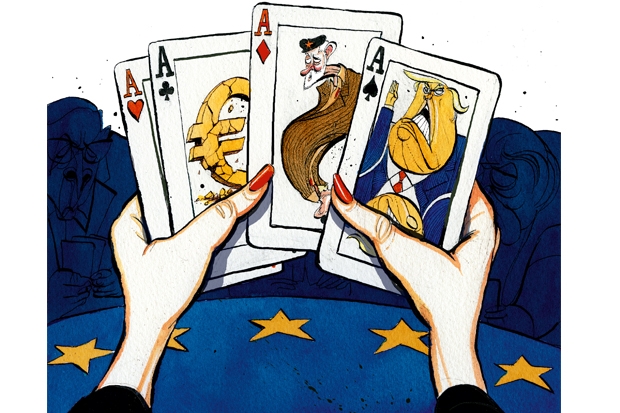The backdrop to Theresa May’s Brexit speech is almost as interesting as the speech itself promises to be. First, there’s the government’s very deliberate decision to make clear—via a Philip Hammond interview in the German press—that Britain will play hardball if it can’t secure a decent deal with the EU. Hammond made clear to Welt am Sonntag that if the UK can’t negotiate a reasonable new trading arrangement with the EU then it is prepared to slash tax and regulation to make its economy more competitive. This is a deliberate attempt to play on European worries about having some kind of Singapore West on its doorstep.
Hammond’s intervention is striking because he had been the senior Cabinet minister most wary about the economic consequences of Brexit. This interview showed he is no longer fighting a rear-guard action in government to try and keep the UK in the single market but has instead moved into how to make Brexit work mode.
Then, there is Donald Trump and his talk of a trade deal with the UK and his prediction that other countries will follow the UK out of the EU. Now, the UK government, obviously, isn’t in control of this talk. There’s also no doubt it puts backs up in Brussels and other EU capitals, making them more defensive and more reluctant to compromise. But the talk of a US deal also shows that the UK has options outside the EU, that it doesn’t come as a supplicant to the exit negotiations. This is helpful to the UK’s position.
Finally, there’s the Barnier leak. The Guardian had a cracking story on Saturday about how the EU’s chief negotiator had told MEPs about how he wanted a ‘special’ deal to guarantee EU firms and countries access to the City of London’s financial markets. The leak was a reminder that there are huge risks for the EU in cutting itself off from the Eurozone’s de-facto banking and financial capital. I suspect that Europe’s need for the City of London is why, ultimately, a deal will be done.
Combine this with the other developments that have strengthened the UK’s negotiating hand—the resilience of the UK economy, Trump and Francois Fillon’s attitudes to Russia, and the failure of Scottish independence to gain support post-Brexit—and May can be more confident of getting a good deal than she would have been on the day she became PM. But it should be remembered that leaving the single market and the customs union, which is where the UK government is heading, is something that May can deliver herself.







Comments